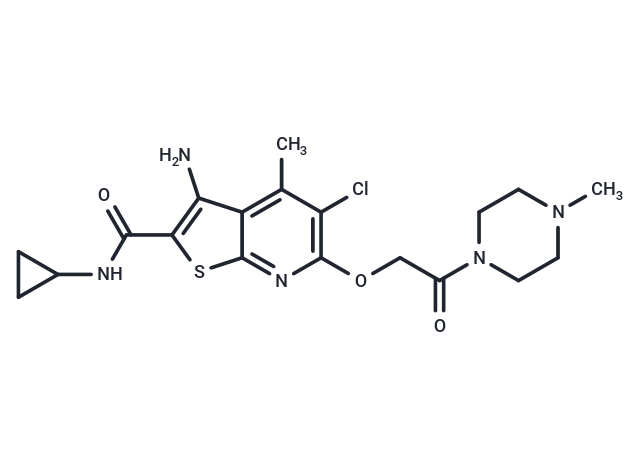Shopping Cart
- Remove All
 Your shopping cart is currently empty
Your shopping cart is currently empty

LY2119620 is a specific, and allosteric agonist of human M2 and M4 muscarinic acetylcholine receptors.

| Pack Size | Price | Availability | Quantity |
|---|---|---|---|
| 1 mg | $52 | In Stock | |
| 5 mg | $125 | In Stock | |
| 10 mg | $198 | In Stock | |
| 25 mg | $345 | In Stock | |
| 50 mg | $483 | In Stock | |
| 100 mg | $679 | In Stock | |
| 1 mL x 10 mM (in DMSO) | $132 | In Stock |
| Description | LY2119620 is a specific, and allosteric agonist of human M2 and M4 muscarinic acetylcholine receptors. |
| In vitro | LY2119620 displays modest allosteric agonism and positively modulates the functional G protein–signaling ability of an agonist at the M2/M4 receptor subtypes by placing the M2 and M4 receptors into an active G protein–bound state. LY2119620 enhances the potency of three muscarinic acetylcholine receptor agonists, ACh, Oxo-M and iperoxo. [1] [3H]LY2119620 can be used as a probe for the human M(2) and M(4) muscarinic receptor allosteric binding sites. [2] |
| Kinase Assay | Biochemical Assay: For IC50 determination, EI1 is serial diluted threefold in DMSO for a total of 12 concentrations, with the starting concentration at 1 μM. The reaction is incubated at room temperature for 120 min, and stopped by adding quench solution (2.5% TFA with 320 nM d4-SAH). SAH production is quantitated using an API 4000 triple quadrupole mass spectrometry with Turbulon Spray coupled with Prominence UFLC. The percentage of inhibition is normalized using positive (no inhibitor) and negative (no enzyme) controls, and IC50 calculated using PRISM. Enzymology studies of S-Adenosyl methionine (SAM) competition are performed with slight modification of reaction condition: 10 μM EI1 is used as the starting dose for serial dilution. SAM is titrated over a range between 1 μM and 50 μM (corresponding to 1 × Km and 50 × Km), and substrate peptide is present in the final reaction mixture at its saturated condition (10 μM). For histone methyltransferase (HMT) profiling in Table 1, all HMTs are purified recombinant proteins from either Escherichia coli or Baculovirus system. The catalytic domain of G9a, SuV39H2, Set7/9, CARM1, SETD8, NSD3, SETD2, and Dot1L, and the full-length SmyD2 protein were used in the biochemical assays. HMT biochemical reactions are carefully characterized with enzymology studies and the SAM and substrate Km determined. The SAM and substrate concentrations are kept at their respective Km for most of the HMTs, except the ones (SmyD2 and Set7/9) with low SAM-Km value, for which 0.5 μM SAM is used. All HMT reactions are performed using the same assay format where the production of SAH from the biochemical reaction is quantitated by LC-MS. |
| Molecular Weight | 437.94 |
| Formula | C19H24ClN5O3S |
| Cas No. | 886047-22-9 |
| Smiles | CN1CCN(CC1)C(=O)COc1nc2sc(C(=O)NC3CC3)c(N)c2c(C)c1Cl |
| Relative Density. | 1.46 g/cm3 (Predicted) |
| Storage | Powder: -20°C for 3 years | In solvent: -80°C for 1 year | Shipping with blue ice. | ||||||||||||||||||||||||||||||||||||||||
| Solubility Information | DMSO: 50 mg/mL (114.17 mM), Sonication is recommended. Ethanol: 10 mg/mL (22.83 mM), Heating is recommended. | ||||||||||||||||||||||||||||||||||||||||
Solution Preparation Table | |||||||||||||||||||||||||||||||||||||||||
Ethanol/DMSO
DMSO
| |||||||||||||||||||||||||||||||||||||||||

Copyright © 2015-2025 TargetMol Chemicals Inc. All Rights Reserved.